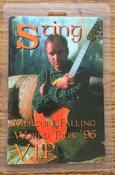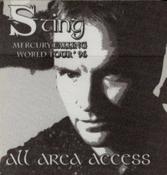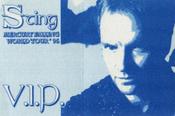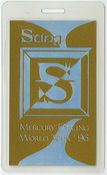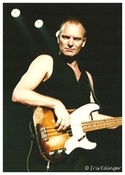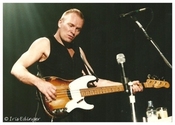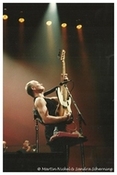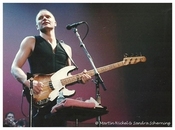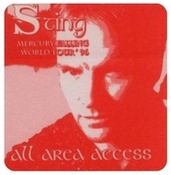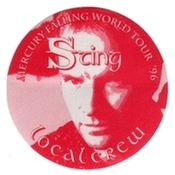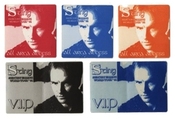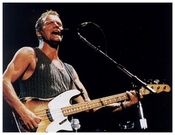
Sting, the man of a hundred faces - Against the backdrop of a sad happiness, a world of seductions...
Nearly ten thousand spectators at the Palaeur for the English singer's triumphant concert.
Sting, one, none, and one hundred thousand. Sting, a thousand souls, triumphed once again at the Palaeur, last night in front of nearly ten thousand people. His return to Rome has a different feel than in the past. Of course, the audience waves, screams, sings along, and sings along during his forays into his glorious past with the Police, from "Synchronicity" to "Every Little Thing She Does Is Magic," from "Roxanne" to "Englishman in New York," which, after an hour and forty minutes, closes the concert by changing its skin, camouflaging itself as a rap version. Here's the second encore, "Every Breath You Take." And like a bottle in the middle of the sea that returns to the surface each time and fills the entire horizon, the Police's epic saga at times joyfully invades the stage. But in the "live" dimension, the effort to project his new artistic identity is clear.
And perhaps human. At 45, Sting, dressed in black leather, is a mature musician who has achieved balance despite his restlessness, his constant zigzagging, and his taste for cross-fertilization. This looms like a never-threatening shadow in the new, poignant compact disc, "Mercury Falling," the heart of the concert with eight songs on the setlist. Here lies a Sting full of soft languor, controlled sensuality, and imaginary symbolism. Having overcome the dark tones, he speaks to us more serenely about the themes that accompany the great circle of life. Even the dialogue with death that he renews, with the astute and candid gaze of an "Operetta Morale," becomes less leaden in "Let Your Soul Be Your Pilot." "I've reached a stage in my life where I don't see death as the end of everything. I see death as a destination, another door to open.
And then there's the winter of old age, in "The Hounds of Winter," the piece that opens the evening and in which Sting imagines himself in the shoes of an elderly person: "The song of an old man, older than he is now," says the musician, "is about the loss of someone you love and how you might feel." The concert immediately takes the form of an initiatory journey into pain and suffering, into the mystery of life. There are citations and references to Keats for the understanding of pain, and to Wordsworth for the adherence to the principle that poetry (like music) returns to dealing with life in its heroic everydayness. But everything is tempered by the soft colours of the philosophy embraced by Sting. And the journey leads back to a coherent "project" that ascends through all the branches of his personality.
Up to the set design: spare, sober, bare. A large canvas in the background and seven panels displaying predominantly natural images. The "new" Sting rarely addresses the audience, which is mature and has grown up with him (only one adolescent banner), and is far from the bombast that distorted his image. By reinventing his repertoire, both old and new, with the precious contribution of the horns, Sting goes against the law of rock, which he has denounced: "It's a conservative genre; people like to listen to the same things over and over again." And the omnivorous yearning for freedom in music translates into aesthetic metamorphoses, linguistic reverberations: from folk to rock, from bossa nova to soul, from jazz to Celtic softness. At 45, Sting is a gambler who shuffles the cards and subverts the rules with the "recklessness" of a child. The concert was opened by Antonella Ruggiero. The former Matia Bazar member has abandoned mainstream pop and says she wanted to break away from the routine. She went to India. She returned with the album "Libera." Now it's clear why Sting himself wanted her as a top support act on his Italian tour.
(c) Corriere della Sera by Cappelli Valerio

